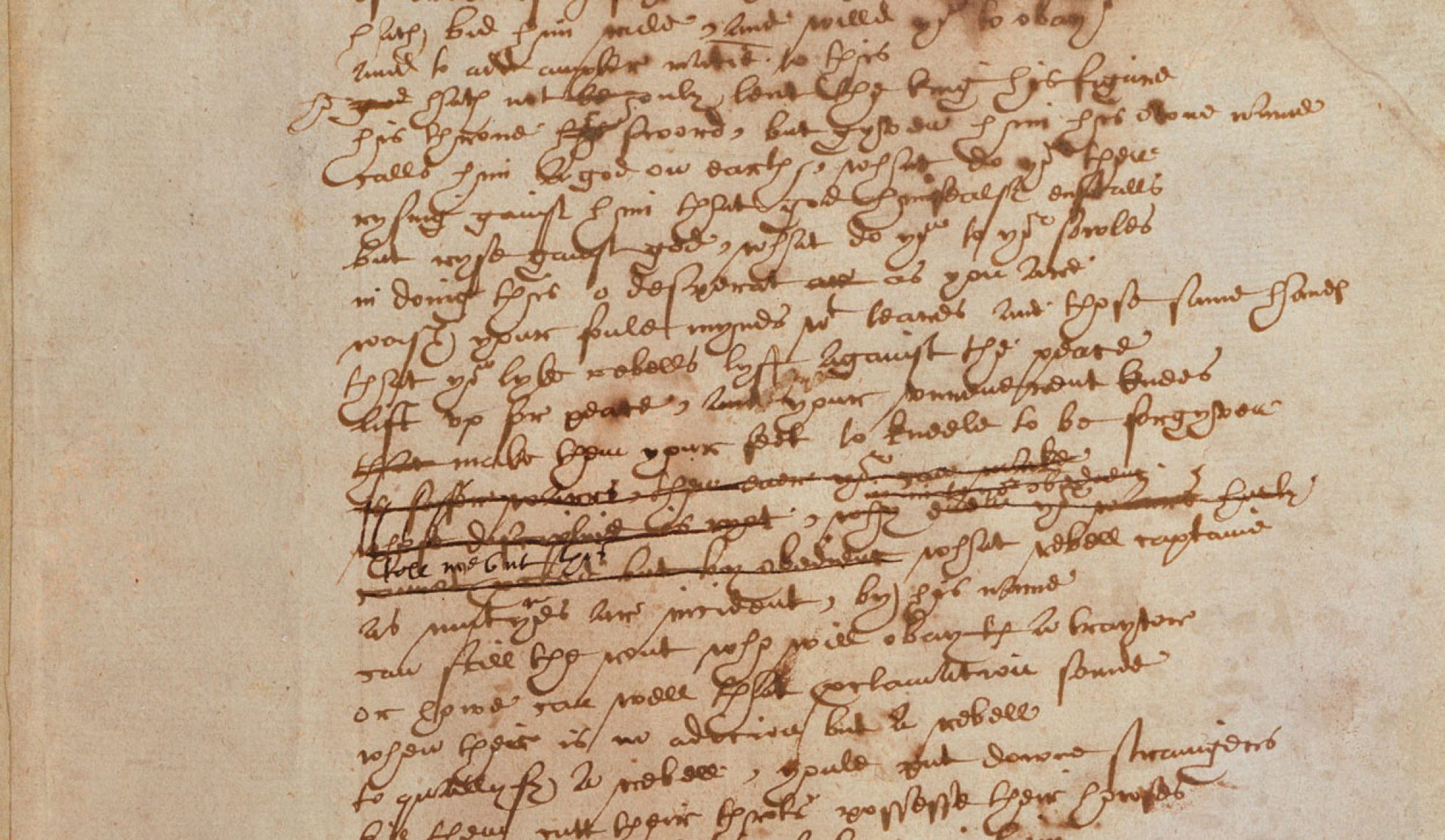Passage for Emphasis – Richard II
HENRY BOLINGBROKE
I thought you had been willing to resign.
KING RICHARD II
My crown I am; but still my griefs are mine:
You may my glories and my state depose,
But not my griefs; still am I king of those.
HENRY BOLINGBROKE
Part of your cares you give me with your crown.
KING RICHARD II
Your cares set up do not pluck my cares down.
My care is loss of care, by old care done;
Your care is gain of care, by new care won:
The cares I give I have, though given away;
They tend the crown, yet still with me they stay.
HENRY BOLINGBROKE
Are you contented to resign the crown?
KING RICHARD II
Ay, no; no, ay; for I must nothing be;
Therefore no no, for I resign to thee.
Now mark me, how I will undo myself;
I give this heavy weight from off my head
And this unwieldy sceptre from my hand,
The pride of kingly sway from out my heart;
With mine own tears I wash away my balm,
With mine own hands I give away my crown,
With mine own tongue deny my sacred state,
With mine own breath release all duty’s rites:
All pomp and majesty I do forswear;
My manors, rents, revenues I forego;
My acts, decrees, and statutes I deny:
God pardon all oaths that are broke to me!
God keep all vows unbroke that swear to thee!
Make me, that nothing have, with nothing grieved,
And thou with all pleased, that hast all achieved!
Long mayst thou live in Richard’s seat to sit,
And soon lie Richard in an earthly pit!
God save King Harry, unking’d Richard says,
And send him many years of sunshine days!
What more remains?
(IV.1.190-222, although we might consider back to where Richard begins at 181 as well)
The iconic and complex “Ay, no; no, ay” (201) at the heart of this passage is perhaps the most obvious place to start. The gloss in my Pelican edition gives two renderings – “yes, no; no, yes” as well as “I, no; no; I” – but I first wonder if the continuation into the next line, “for I must nothing be; / Therefore no no, for I resign to thee” might not also suggest other permutations of meaning as well. For example, “Yes, no; [because] no I,” would very closely fit the continuation.
Richard’s remark is also the simplest (and thus clearest) possible example of a chiasmus, which by its simplicity draws my attention as well. First, the chiastic structure of “Ay, no; no, ay” – a literal inversion – parallels the scene of inversion as well, a subversion or reversal of the natural order that the deposition of kings very much embodies. Furthermore, note how closely it parallels lines 191-3: “My crown I am; but still my griefs are mine” [I, no] “… But not my griefs, still am I king of those” [no, I] – given the deeply introspective speech that follows, this distilled repetition raises questions of Richard’s mental state – is he paying attention to Bolingbroke? This question might be answered by the rhyme scheme – Bolingbroke’s question “Are you contented to resign the crown?” in l. 200 is an interruption of the rhyming couplets that began in l. 188, and Richard seems to ignore it as he does not complete Bolingbroke’s couplet, as he had earlier in lines 191 and 195.
The word “resign” drew my attention in this passage as well; the OED notes the metonymic way in which resigning an object such as a crown has a double meaning – both of giving up and of giving to. Might this suggest another nuance to the “Ay, no; no, ay”? Is Richard being coy with Bolingbroke, content to give up one but not the other? Or is this play on words – this combination of an aural figure and a syntactical one – yet another display of Richard’s vast rhetorical power, the kind of power that can people an empty world, the kind of power that stands in so much contrast to Bolingbroke’s terse and impatient statements and questions?
The chiasmus of “Ay, no; no, ay” also draws significant attention to the flexibility of the monosyllabic “I” in meter, as it sets up a possible trochee-iamb pair that demonstrates both possible uses of “I” as stressed upbeat and downbeat. “I” appears iambically stressed at first “for I must nothing be” and “for I resign to thee” but then trochaically in “I will undo myself” – the immediate emphasis being on Richard’s own person. Following from the above emphasis on “resign,” note here that though Richard “[resigns] to thee,” his subsequent speech is rather of the giving up sense – “how I will undo myself.” As King Richard unwinds the symbols of his power, we also hear “I” as unstressed, as leading an iamb. “I give,” “I wash,” “I give” in lines. 204, 207 and 208 seem iambic, but the unstressed I is a beautiful formal echo of how Richard had just renounced “the pride of kingly sway,” just as how we hear in “deny” (209) an echo of the stressed “I” without any “I” being present – the “I” has been denied, as it were, just as it was replaced by “no” in “Therefore no no.”
A parting thought for discussion: is it also possible to hear other homophones in “Ay, no; no, ay”? Especially “eye,” after Richard’s subsequent list of body parts? Might “no eye” contrast with “years of sunshine days” (220)? Might we also hear “mine ays are full of tears” for line 244? Broadly, what else might “ay, no; no, ay” suggest?
Yan Che
